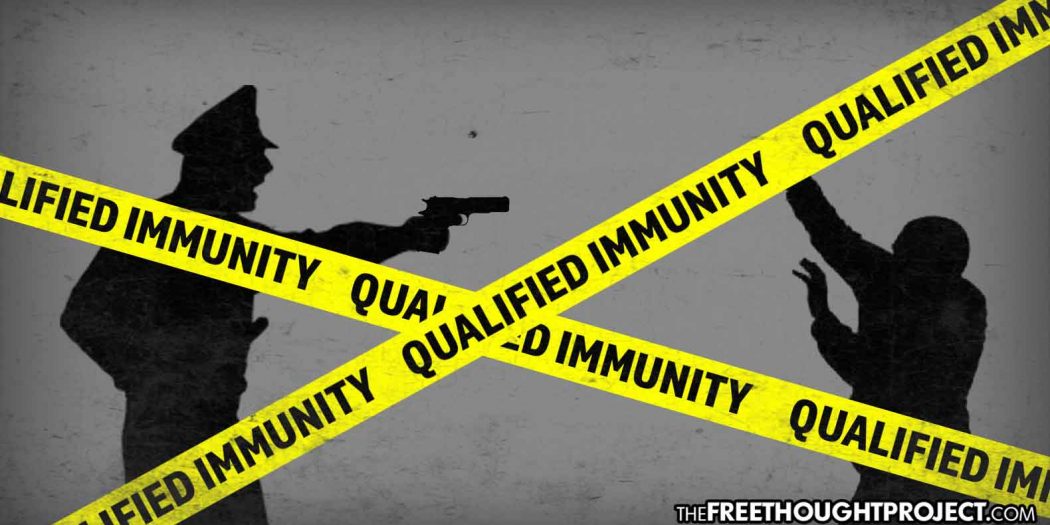 By Matt Agorist
By Matt Agorist
As TFTP reported last month, in an unprecedented move, the New York City Council passed sweeping legislation to go after bad cops by removing qualified immunity, ushering in a new era for police accountability. Then, this week, New Mexico followed suit and also did away with qualified immunity for cops. It was the beginning of the end of no accountability for bad cops.
As the blue wall began crumbling, however, Iowa decided they would add a few bricks back in it, to keep it held up. Instead getting rid of the highly unethical doctrine which lets cops violate the constitutional and civil rights of individuals with immunity, Iowa just doubled down on it.
Despite a massive shift in the law enforcement paradigm happening across the country, Iowa decided it was time to give cops even more legal protection to violate the rights of their citizens. As the Gazette reports:
The Iowa Senate passed legislation Monday intended to strengthen ‘qualified immunity” for law enforcement officers who take forceful action in situations where state law is ‘not sufficiently clear” to understand their conduct might violate someone’s constitutional protections.
Majority Republicans said the statutory language is needed to clarify court rulings and provide ‘balance” in cases where the law was not ‘clearly established” at the time of an incident giving rise to a claim against an officer.
As TechDirt points out, the bill does more than give Iowa officers a new defense tactic. It codifies the US Supreme Court’s watered-down legal standards that have made it extremely difficult for plaintiffs suing over rights violations to succeed.
Under provisions of the legislation, a law enforcement officer would not be found liable in any action for damages in an individual capacity if the state law was not sufficiently clear so that the officer would have understood the conduct was a violation of the Constitution or any other law, or the law was not clearly established at the time of the incident giving rise to the claim against the officer.
The burden would be on the plaintiff to show that the law enforcement officer violated a clearly established constitutional or statutory right and the officer’s employing agency would not be liable if the officer was found not to be liable under the new provision.
As TFTP has reported, when it comes to police accountability, one overarching question remains. ‘Do we want to live in a society whereby law enforcement officials can completely violate a person’s constitutional rights and get away with it?’ For our society to be free, the answer to that question must be a resounding, powerful, unwavering, ‘Hell No!’
Unfortunately, however, Iowa is answering that question with a ‘hell yes.’
The protection cops haven enjoyed for decades started when the Supreme Court created qualified immunity in 1982. With that move, the court granted all government officials immunity for violating constitutional and civil rights unless the victims of those violations can show that the rights were “clearly established.”
As Anya Bidwell points out, although innocuous sounding, the clearly established test is a legal obstacle nearly impossible to overcome. It requires a victim to identify an earlier decision by the Supreme Court, or a federal appeals court in the same jurisdiction holding that precisely the same conduct under the same circumstances is illegal or unconstitutional. If none exists, the official is immune. Whether the official’s actions are unconstitutional, intentional or malicious is irrelevant to the test.
It is essentially a get out of jail free card for cops and it perpetuates the problem of police violence by giving bad cops a free pass.
Before New Mexico decided it was time to end qualified immunity this month, even folks who proved they were framed by cops and imprisoned unjustly could not go after the ones who put them there.
“I came within nine days of execution for a crime I didn’t commit and qualified immunity prevented me from holding responsible the sheriff’s deputies who committed egregious misconduct and stole my freedom,” said New Mexico exoneree Ron Keine said, according to the Innocence Project.
When innocent people who have had their lives ruined cannot seek justice against the ones who ruined it, this is the antithesis of a free country. Is this the route Iowa wishes to take? Sure seems like it.
Source: The Free Thought Project
Become a Patron!
Or support us at SubscribeStar
Donate cryptocurrency HERE
Subscribe to Activist Post for truth, peace, and freedom news. Follow us on Telegram, SoMee, HIVE, Flote, Minds, MeWe, Twitter, Gab and Ruqqus.
Provide, Protect and Profit from what’s coming! Get a free issue of Counter Markets today.
As States Remove Qualified Immunity, This Tone Deaf State Just Passed A Bill Approving It